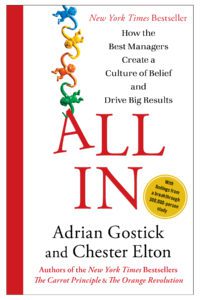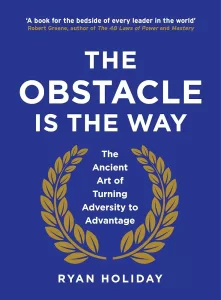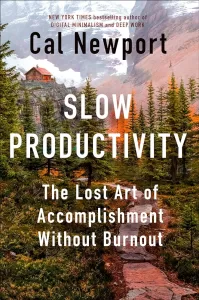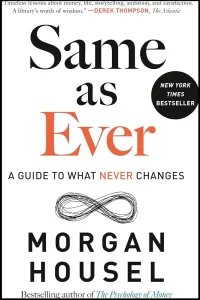Book Review: “All In”
Book: All In by Adrian Gostick and Chester Elton
Reviewer: Bobby Powers
My Thoughts: 7 of 10
All In is a great primer for how to create an amazing work culture. It's full of reminders about how to keep your team engaged and aligned. As I read All In, I evaluated my company against the leadership traits and practices described in the book, and I'm convinced every company would be better if we could practice what Gostick and Elton preach.
Takeaways from the Book
Sell the Story, Not the Product
- “Good companies will tell you what they do and how they do it; great companies focus on why they do what they do for their customers.”
- “As counterintuitive as it may sound to some, the thing that sets you apart from your peers is rarely what you sell or how you package or promote it. You all look pretty similar to us consumers. No, unless you’ve just invented the iPod of your industry, it’s likely that your competitors offer, more or less, the same things you do at about the same prices. The secret of moving a business forward is in getting your working population to differentiate you.”
- “Keep your mission simple and aspirational, and your values to a manageable list—three is ideal, with five as a maximum.”
Look for Disconfirming Feedback
- “Most organizations are oblivious to what customers find attractive about rivals. The best leaders encourage vigilance for disruptive solutions or trends that might harm or benefit their firm.”
- “A culture of customer focus provides channels for employees to report upward issues they see on the front lines, rewards them when they spot something important, encourages them to find challenges invigorating, and empowers people at all levels to respond to those challenges with alacrity and creativity.”
- “There’s something exhilarating about facing the facts head-on, something that helps people feel like they are being brought into the inner circle.”
Importance of Agility and Innovation
- “Sometimes when you innovate, you make mistakes. It is best to admit them quickly, and get on with improving your other innovations.” -Steve Jobs
- “The most agile companies aren’t afraid to allow different, interesting organizational structures to exist, reflecting the diversity of the tasks it has to perform to meet customer requirements. And in these firms, people and assets are redeployed and reconfigured rapidly when the market shifts.”
- “In customer-focused firms, leadership puts more responsibility in the hands of key employees who are asked to push the entire organization forward. They are given permission to disrupt and innovate with the customer in mind.”
Aspects of a Fantastic Culture
- “You as the manager are the core influencer of the kind of culture at play in your team, division, or whole company.”
- “Tell it like it is. Great managers leave the ‘pillows’ at home, the tendency most of us have to soften the blow (and thereby dilute clarity). They have hard conversations with employees and even clients, thus building honest long-term relationships. A singular characteristic of these great leaders is their ability to keep their emotions in check during these discussions while focusing team members on positive outcomes.”
- “Managers must create a WIIFM, or ‘what’s in it for me,’ for each person. We would be hard pressed to name a successful executive we’ve encountered in our travels ho hadn’t put considerable thought into delivering value to his or her customers. The trouble is, very few leaders spend much time answering what’s-in-it-for-me questions for their employees—the people who serve those customers with either energy and smiles or grudging reluctance.”
- “Allowing employees to insert their style and creativity into an assignment without unnecessary censorship demonstrates trust in employees’ abilities. And the experience of taking the lead builds competency, a sense of ownership, and trust in you as a leader. Look, we know it’s hard to hold back criticism, and a manager wants to always be right, but a good rule of thumb is, ‘If it’s 70 percent as good as you would have done it, then leave it alone.’”
- “Following our first instinct to do the right thing, even ignoring any personal consequences, will nearly always create respect from those around us.”
- “Culture eats strategy for breakfast.” -Peter Drucker
Importance of Recognition and Feedback
- “Top-down and peer-to-peer recognition fulfill separate human needs. The first enhances a sense of job security, of well-being, and that there are opportunities for development. The latter emphasizes that you have friends at work, that you are accepted, and that others have your back.”
- “The following formula can help leaders recognize employees or help peers thank each other: Do it now, do it often, be specific, be sincere.”
- “Cultures that treat everyone the same, no matter their personal contribution, are demoralizing for high achievers.”
Strong Guiding Principles Used by a VP at American Express
- “We communicate openly, honestly, and candidly.”
- “We seek solutions and not blame."
- “We try to involve people in decisions that affect them."
Think you’d like this book?
Other books you may enjoy:
- The Five Dysfunctions of a Team by Patrick Lencioni
- Creativity, Inc. by Ed Catmull with Amy Wallace
- The Culture Code by Daniel Coyle
Other notable books by the authors:
- The Carrot Principle by Adrian Gostick and Chester Elton
- The Orange Revolution by Adrian Gostick and Chester Elton
Want to become a stronger leader?
Sign up to get my exclusive
10-page guide for leaders and learners.





